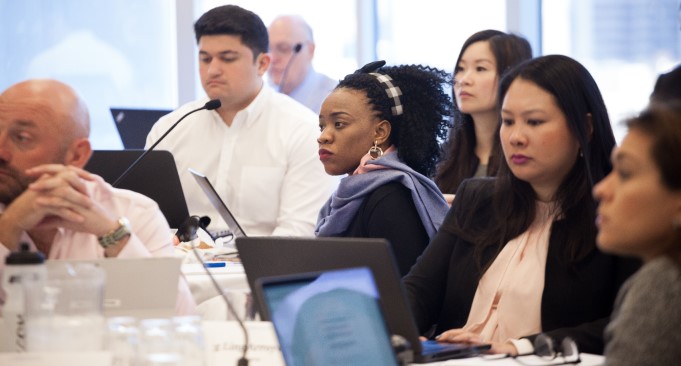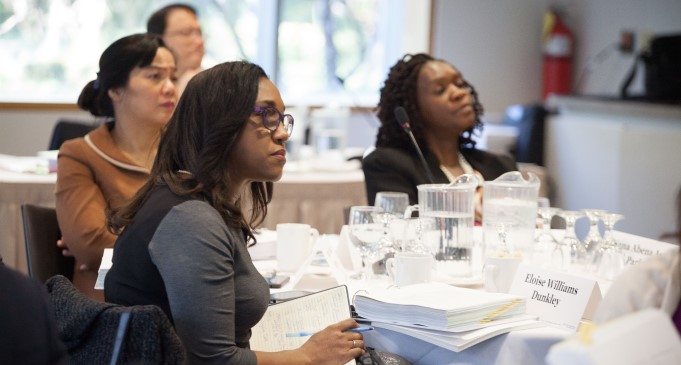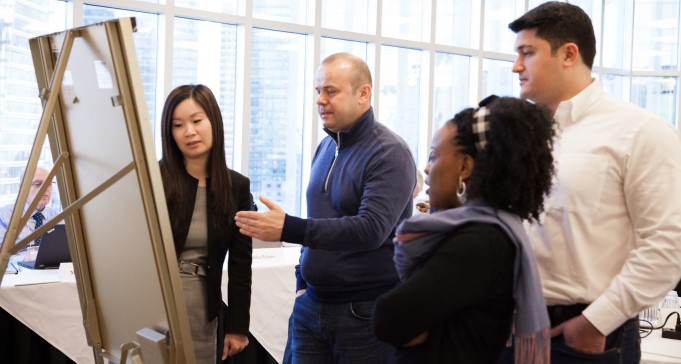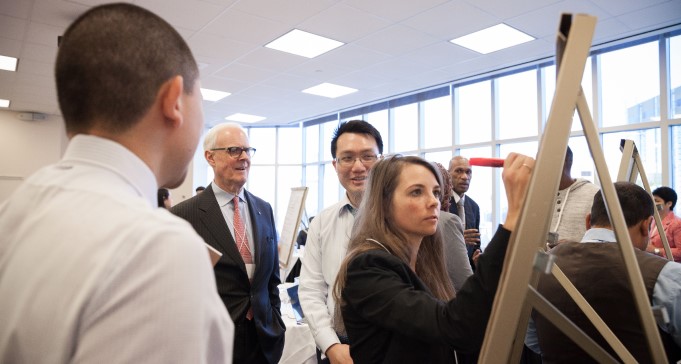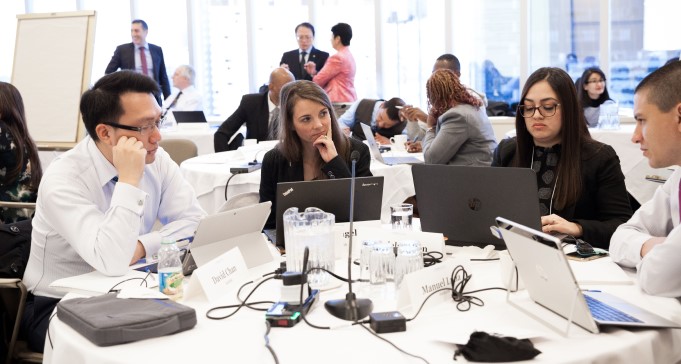Micol Pistelli, Senior Financial Inclusion Coordinator, United Nations HighCommissioner for Refugees (UNHCR) discusses the plight of forcibly displacedpersons and how supervisors can better support their financial inclusion. Read their biographies here. Read the transcript here.
Listen to the Podcast:
Read the Transcript:
Speaker:
Micol Pistelli
Senior Financial Inclusion Coordinator at UNHCR
Host:
Anatol Monid
Senior Director, Programs, Toronto Centre
Date:
July 11, 2022
Transcript:
Opening automation:
You're listening to Toronto Centre podcast. Welcome. The goal of TC podcast is to spread the knowledge and accumulated experience of global leaders, experts, and world-renowned specialists in financial supervision and regulation. In each episode, we'll delve into some of today's most pressing issues as it relates to financial supervision and regulation. The financial crisis, climate change, financial inclusion, FinTech, and much more. Enjoy this episode.
Anatol Monid:
Hi everyone. Welcome to TC Podcast's On The Go. I'm Anatol Monid, a senior director with the Toronto Centre. Today I have the pleasure of speaking with Miss Micol Pistelli. Miss Pistelli is a Senior Financial Inclusion Coordinator with the United Nations High Commissioner for Refugees. I will let Miss Pistelli introduce herself and talk about the UNHCR in a moment. Her profile is available on our website as well. Our conversation will focus on financial inclusion for forcibly displaced persons. Almost 100 million people worldwide were forcibly displaced as of today. This issue has a personal connection for me.
My parents were both displaced by the events of World War II and my mother's journey, in particular, at an early age, took her from Northern Europe, along with tens of thousands of other deportees through the Middle East to Africa. Eventually, she was living in villages across East Africa for several years. Finally, both my parents were resettled from different locations, finding their way to Canada. So, the circumstances of all refugees are heartfelt for me and even more so due to the unjust war in the Ukraine and the plight of its citizens seeking refuge in neighboring countries from attacks on innocent civilians. Welcome Miss Pistelli, Micol, and thank you for taking the time to speak with me today.
Micol Pistelli:
Thank you, Anatol. It's a pleasure to be here. So, to your question, UNHCR is a primarily mandated to provide international protection and humanitarian assistance for persons whose lives have been uprooted as a result of conflict, violence, persecution, human rights violations. The people UNHCR works with and for are refugees, asylum seekers, internally displaced, returnees, and stateless people. UNHCR also seeks permanent solutions, meaning the chance for forcibly displaced to return home in safety and dignity, to integrate locally, or in the most vulnerable cases to be resettled to a third country.
UNHCR was created in 1950 during the aftermath of the Second World War to help millions of Europeans who had fled or lost their homes. And today, over 70 years later, we have reached the unimaginable figure that you mentioned, a hundred million people, being forced to flee their homes. Besides the war in Ukraine, major sources countries of forcibly displaced are Syria, Venezuela, Afghanistan, South Sudan, Myanmar. Additionally, there are new or continuing emergencies in place, such as Ethiopia, Burkina Faso, and Nigeria, the Democratic Republic of Congo, which have all contributed to this staggering figure.
About my role at UNHCR. I am a Senior Financial Inclusion Coordinator. I support country operations to advocate for forcibly displaced access to affordable and suitable financial services. We work to build awareness about the challenges that this population faces in accessing formal financial services and to find solutions to overcome policy constraints, market constraints, and misconceptions that hinder refugees access to financial services.
Anatol Monid:
That's an important role, and hopefully today's conversation can help with that awareness building. When people become displaced for whatever reason, they often leave their homes quickly or are not able to access their residences. Valuable documents and records maybe forgotten, abandoned, lost, destroyed, taken, or stolen. This makes it difficult for persons to identify themselves, connect with their former financial institutions or access host country formal financial services. What can you tell us about the barriers to access financial services that displaced persons face?
Micol Pistelli:
You touched upon one of the main barriers that refugees and asylum seekers face when trying to access financial services, which is a lack of proper documentation that may either limit access or lack recognition by financial service providers. Along these issues that are also inconsistencies within country regulations, as well as misalignment between country's policy directives and the practices followed by financial service providers.
Financial institutions are also often unaware of the legal rights and the socioeconomic profiles of refugees. So, they do not see the business case for targeting them. And these challenges do not only prevent refugees from accessing financial services, but also from obtaining sustainable livelihoods through decent work, as an entrepreneur or as an employee, which often require a bank account and other mainstream financial services. And in addition, in many countries, limited rights to work and to move further restricts refugees access to mainstream financial service providers.
Anatol Monid:
These are important hurdles to have to overcome. So, do you have any views about how the various players in a host country's financial services' ecosystem like financial institutions, governments, central banks, financial supervisors, or regulators, and aid agencies can play in overcoming these barriers?
Micol Pistelli:
There is certainly a role to play for each stakeholder group involved in the financial inclusion of forcibly displaced persons. It is, in fact, required a concerted effort by a variety of stakeholders working together to overcome existing regulatory barriers, unleashing capital for investment, collecting data and sharing evidence and good practices. Governments and more specifically policy makers and financial regulators can create an enabling regulatory environment to ensure that forcibly displaced have access to a form of financial services yet still ensuring sound compliance with anti-money laundering and counterterrorism finances principles, and procedures.
In fact, including the forcibly displaced in the formal economy will contribute to a reduction of money laundering and terrorism financing risks associated with their financial exclusion, as people will not have to rely on high risk, informal financial services that may actually jeopardize the country's efforts to combat financial crimes. And donors and the private sector can also combine their funds to mobilize resources that create the right market incentives for financial service providers to extend their services to the forcibly displaced. And so blended finance instruments can catalyze private sector financing for scalable investments to address the economic and social challenges faced by forcibly displaced and their host communities, as well as demonstrate the commercial viability of investments impacting this population.
Anatol Monid:
I think it was an important point that you made that inclusion in the formal economy can reduce the risk of financial crime and help improve financial stability. So those are important lessons. What are some key actions that regulators and policy makers can take to address specific needs to access to the formal financial services by forcibly displaced persons?
Micol Pistelli:
I would say that first, regulators and policy makers can promote an enabling regulatory framework. So, following a risk-based approach to help establish a tier know your customer, and customer due diligence requirements in line with the Financial Action Task Force recommendations. So, the recommendations of the task force already offer some flexibility to ensure that certain groups, such as low-income individuals and specifically displaced persons or refugees, are not unreasonably excluded from accessing financial services. As we mentioned, these groups often do not possess the proper identification document and therefore not able to meet the traditional customer due diligence requirements.
So, regulators can therefore ensure that financial service provider accept other types of evidence of identities, such as refugee cards or supporting letters from community leaders in refugee camps when that is applicable. Additionally, they should also provide clear, specific guidance to financial service providers on how related policies, regulations, directives, should be interpreted to avoid legal uncertainty in providing services and products to forcibly displaced, which is often a challenge.
Secondly, I would say that national financial inclusion strategies, as they are government endorsed policies, are a particularly important reference for financial service providers willing to extend products and services to the forcibly displaced. So, policy makers should explicitly mention this population as a target in their strategies. And then one more critical action concerns the area of digital payments, which are becoming increasingly important in development and humanitarian payments. So proper regulations are needed to ensure that robust digital payment and agent banking regulations are in place to support the use of digital platforms.
They can rapidly be used to scale up access to financial services for all, including the forcibly displaced, especially those who are living in settlements far from urban centers or in rural areas where there are no points of services of financial services providers nearby. Of course, we know that many refugee hosting countries face a number of challenges in enabling digital payments. And so, this is an area where public private partnership can make the difference in enhancing payment solution. For example, also linked to social protection program schemes, and so to foster financial inclusion for all at the national level.
Anatol Monid:
Thank you, Micol. I think you spoke about a couple of things that are important, and we often see in our Toronto Centre work is building risk-based supervisory models that are proportionate for the circumstances following the FATF guidance and standards. And it's very important that countries have their national financial inclusion strategies, and those supervisors are included in the development and delivery of those strategies. So, thanks for reinforcing that. Do you have any examples from your experience about how some financial supervisors or central banks have dealt with financial inclusion for displaced persons in their jurisdictions?
Micol Pistelli:
Yeah, we do have positive examples of some jurisdiction that host refugees, which have permitted UNHCR IDs to satisfy their KYC requirements. So, in Zambia, for example, the central bank has granted approval for mobile money service providers to provide financial services to refugees who present identification cards or registration documents issued by the Ministry of Home Affairs. Going to the Middle East, the Central Bank of Jordan included the refugees in the Jordanian National Financial Inclusion Strategy, and they launch the Jordan Mobile Payment, the JoMoPay, which is their national centralized payment switch that connects refugees to a payment ecosystem, providing them with access to a mobile wallet.
On the digital financial services, a good practice comes from Uganda where the Communications Commission issued a policy directive to the mobile industry enabling the majority of refugees with a valid refugee ID to legally access SIM cards. Another interesting area is on building awareness about refugee’s own rights to access financial services. And so here, a good practice comes from Brazil where the central bank, in partnership with government authorities, UNHCR, and IOM, has released a booklet containing guidelines for migrants and refugees on topics such as opening bank accounts, accessing loans, but also about warnings and not to be victims of scams. And also, general information about the functioning of the Brazilian financial system.
Now more recently, the EU, through their temporary production directive, is ensuring access by refugees from Ukraine to temporary EU residency and gives them right to access and use also a financial account with basic features. While thinking about Ukraine, UNHCR has a setup, in record time, a cash assistance program to support the internally displaced persons, in cooperation and in coordination with the Ministry of Social Policy and the Office of the President of Ukraine to ensure that our cash program was aligned with, and also complimentary to, their existing social assistance program. And so UNHCR essentially receives the referrals for cash disbursement directly from the ministry of the register, the internally displaced that have specific vulnerabilities and therefore can receive cash assistance.
Anatol Monid:
Great. So those are excellent examples, and they provide those supervisors and national entities with ways that they can help with financial inclusion for forcibly displaced persons. I particularly liked the idea from Brazil about the booklet to help with inclusion, but also to help people become aware of not being further victimized in their circumstances. We have a bit of time, Micol. Can we change the topic a little bit?
I recently read in the UNHCR Canada's UNtold Stories newsletter that with over 100 million refugees and displaced a person's worldwide, climate change is one of the greatest threats in the world already marred by conflict. And that every year more than 20 million people leave their homes and move to other areas in their countries because of climate issues. It would seem to me that taking action against climate risks can help reduce the number of refugees and displaced persons as a first step. What's the UNHCR's position on climate change?
Micol Pistelli:
So UNHCR is providing protection and assistance to many refugees and other people displaced who have been affected by climate change. And climate change creates internal displacement before it reaches a level where people are forced to cross the borders. However, we are witnessing increasing situations where people may have a valid claim for refugee status, whereas the climate emergency exacerbates an already very unstable and fragile situation characterized of armed conflict, widespread violence.
And this is the case in particular of the Sahel region, which is one of the fastest growing displacement crises in the world, and where conflict has forced almost 3 million people to flee both within the countries and across borders. And this region is also experiencing extreme temperatures, which are increasing at one and a half times as fast as the global average. And so, this is causing a higher frequency of droughts and floods, which are threatening livelihoods and are aggravating food insecurity as people have reduced access to land and agricultural production.
Anatol Monid:
And just for our listeners benefit, the Sahel region, could you just clarify which countries that might involve or which region that is in Africa?
Micol Pistelli:
Yeah. The Sahel is vast semi-arid of Western and North Central Africa. Just stretches from Senegal in the west up to Djibouti in the east. And it includes countries such as Burkina Faso, Mali, Chad and Niger, which are the countries where we are seeing this unprecedented rural exodus, and a big new wave of forcible displacement.
Anatol Monid:
Thank you for that. And I think that for the North American listeners, North America has faced climate refugees already. The 1930s dust bowls and the migration from the Central Prairie regions to places like California and elsewhere was a stark example of climate refugees and migration. It's good to know that the UNHCR is prepared to help those people affected by climate change, because the news is full of those extreme weather events. It's been great talking with you, Micol. Any last words for central bankers, financial services supervisors and regulators about financial inclusion for forcibly displaced persons?
Micol Pistelli:
Yeah. Maybe I will say that there are a number of documents and guidelines that have been drafted and are readily available with recommendations about what roles central banks, financial services supervisors, regulators can play to improve access to financial services for forcibly displaced. So, my recommendation is to familiarize with the barriers faced by this population in their country, look at existing good practices in other jurisdictions, such as some of those that I was mentioning before, and engage with UNHCR to gather more data, information and to jointly find solutions.
Anatol Monid:
Thank you very much, Miss Pistelli. It's been my pleasure and honor to have you speak with me today.
Micol Pistelli:
It's been a pleasure. Thank you, Anatol.
Anatol Monid:
Thank you. TC has developed and delivered programs related to risk-based supervision and financial inclusion that may assist your agency in supporting financial inclusion for displaced persons. We're happy to discuss an opportunity to develop such a program for your jurisdiction, authority, or agency. Other related program development on financial crime is also underway, so make sure you sign up for our newsletter and alerts.
Toronto Centre has trained more than 17,000 supervisors since its founding in 1998, and this work is generously supported by Global Affairs Canada, the Swedish International Development Cooperation Agency and the International monetary Fund, and our other founders. I'm here today in Toronto, Canada, speaking with Miss Micol Pistelli, Senior Financial Inclusion Coordinator with the UNHCR, and you've been listening to a Toronto Centre Podcast On The Go. Thanks for joining us.















